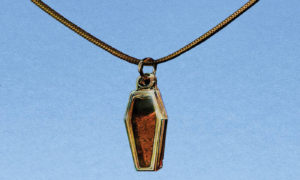 Arcade Fire’s fourth full-length album Reflektor is a marvelous achievement. Working for the first time with former LCD Soundsystem front man James Murphy, the band has created a complex album, stylistically diverse yet sonically cohesive, that proves the band can retain its distinct sound while traveling in completely new directions.
Arcade Fire’s fourth full-length album Reflektor is a marvelous achievement. Working for the first time with former LCD Soundsystem front man James Murphy, the band has created a complex album, stylistically diverse yet sonically cohesive, that proves the band can retain its distinct sound while traveling in completely new directions.
The songs are informed by post punk, synth pop, disco, dub, dance, and reggae, but delivered in Arcade Fire’s unmistakable style. Musical and lyrical motifs develop throughout the record, flashing briefly in a single line of the lyrics or one snippet of a melody. Elements of dance music, from synths and industrial beats to tribal rhythms, provide structure, but this isn’t a dance album. Instead, these tendencies are balanced by a healthy dose of rock, punk, and experimentation—the angular guitars on opening pair “Reflektor” and “We Exist,” the whining guitar on “Normal Person,” or the marchy snare and chanted refrain of “Joan of Arc” that recall Mission of Burma or The Clash.
Unsurprisingly, considering the work of James Murphy, the album marks the most rhythmic album Arcade Fire has released. However, these new rhythms can be solely attributed to their newfound collaborator. Band member Regine Chassange was born in Haiti, a country of colorful costume and festive music. The country celebrates the Carnival season and the music derives from French ballads and traditional African rhythms.
The band wrote about Haiti on Funeral, and referred to the Haitian proverb “Déyé món gen món” (“Behind the mountains, there are mountains”) on The Suburbs. Haiti’s influence has been there, but on Reflektor, it’s more ingrained in the music than ever before. Bongos punctuate a number of arrangements along with sustained, soulful sax notes, and the songs possess a greater emphasis on bass. Further, Arcade Fire’s extended SNL performance felt like a glow-in-the-dark Mardi Gras, and when the band posted the entire album stream on YouTube, it came in the form of a lyric video with the complete footage of Marcel Camus’s film Black Orpheus, which is set during Carnival.
The Greek myth at the root of that film plays a huge role in the thematic staging of Reflektor, particularly on the second half of the album. Back to back songs, Beatles-esque anthem “Awful Sound (Hey Eurydice)” and the pulsing synth-centered “It’s Never Over (Oh Orpheus),” incorporate references to the story of lovers separated by death. In the myth, Orpheus even makes a trip to the underworld to retrieve his beloved, but a single moment of doubt causes him to lose her forever. If understood as the constant push and pull of love and unavoidable unrequited feelings, “Afterlife” works as a perfect conclusion to this pair, as Win Butler sings, “Can we work it out? We scream and shout ‘til we work it out.” Strangely, “Porno” separates these two movements; if there’s a thematic significance there, I’m missing it. “Porno” seems to work better at the end of side one, and maybe the upbeat, dancy “Here Comes the Night Time” gets slated as the opener of side two. But it’s hard to be picky about a nearly perfect album.
Here I’ve spent four solid paragraphs on the musical and lyrical themes of Reflektor without saying much about the songs themselves, and rightfully so—with a band this attuned to detail, the music is there. The songs are not only catchy and aurally delicious, but also possess an impressive number of hooks, flourishes, and embellishments. Reflektor is rich and deep, but not unnecessarily full. In other words, Arcade Fire has restrained themselves from overdoing the instrumentation on every song, knowing when a song needs to soar magnificently in a cacophonous swirl of orchestration, and when a simple piano hook will be effective.
The mixing on Reflektor is impeccable: strings sweep in the background as clear synths work in the foreground, the percussion works in tandem with the bass lines, and almost imperceptible secondary guitars or miscellaneous parts hover in the periphery. This effect, coupled with rough beginnings and ends and sound bytes of stage introductions or conversations, gives the album the texture of a live performance, an approach that works well with Arcade Fire’s earnest and heartfelt lyricism and ethos.
After winning a Grammy, at a time when Arcade Fire could easily have reworked The Suburbs and most people wouldn’t have minded, the band has created something wholly new and ambitious. Reflekor is their best album to date. And while the songs, each and every one, are amazing, it’s their cohesive nature that grants the album its true significance. Who would expect less than this sort of grand gesture from a band as expert as Arcade Fire? In an age of songs, Arcade Fire has crafted an album—and it’s a masterpiece.









